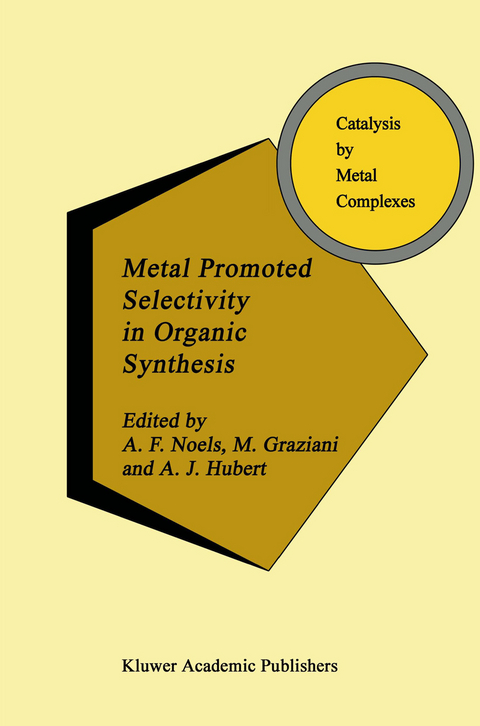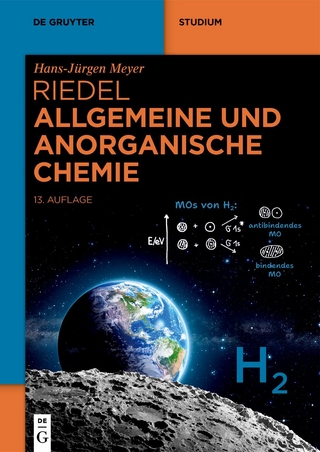
Metal Promoted Selectivity in Organic Synthesis
Springer (Verlag)
978-94-010-5508-6 (ISBN)
Industrial Aspects of Selectivity Applying Homogeneous Catalysis.- 1. Contributions of homogeneous catalysis to selectivity.- 2. Selectivity and homogeneous, industrial processes.- References.- To which Extent do Phosphanes Induce Selectivity in C?C Bond Formation?.- 1. Introduction.- 2. Structural, physical and bonding properties of phosphanes.- 3. Oligomerisation of alkenes.- 4. Oligomerisation of butadiene.- 5. Hydroformylation of alkenes.- 6. Conclusion.- References.- Ligand Controlled Catalysis: Chemo to Stereoselective Syntheses from Olefins and Dienes over Nickel Catalysts.- 1. Diene-olefin codimerization.- 2. Cyclodimerization of dienes.- 3. Linear dimerization of dienes.- 4. Concluding remarks.- References.- Catalytic Activation of Hydrogen Peroxide in Selective Oxidation Reactions.- 1. Introduction.- 2. General discussion on the activation of hydrogen peroxide.- 3. Practical applications.- 4. Conclusion and safety rules.- Acknowledgements.- References.- Enantioselective S-Oxidation: Synthetic Applications.- References.- Mechanisms in Stereo-Differentiating Metal-Catalyzed Reactions. Enantioselective Palladium-Catalyzed Allylation.- 1. The palladium-catalyzed substitution of allylic substrates by nucleophiles. The reaction. The catalytic steps.- 2. The stereochemical course of the reaction; analysis of the stereochemistry of each individual catalytic step.- 3. Enantioselective synthesis. Asymmetric induction.- References.- Regio-, Stereo-, and Enantioselectivity in Palladium and Platinum Catalyzed Organic Reactions.- 1. Introduction.- 2. Rearrangements.- 3. 1,4-Difunctionalization of 1,3-dienes.- 4. Cyclisation of non-conjugated dienes.- 5. Asymmetric alkylation via ?-allyl Pd complexes.- 6. Asymmetric hydroformylation.- References.- AsymmetricHydrogenation.- 1. Introduction.- 2. General principles.- 3. Asymmetric hydrogenation of substituted olefins.- 4. Asymmetric hydrogenation of carbon-oxygen double-bonds.- 5. Asymmetric hydrogenation of carbon-nitrogen double-bonds.- References.- The Design of a Chemoselective Reduction Catalyst.- 1. Introduction.- 2. Reduction of ?, ?-unsaturated ketones.- 3. Conclusions.- Acknowledgements.- References.- Palladium Catalyzed Reduction of Aryl Sulfonates Selectivity Control and Application to Anthracycline Chemistry.- References.- Selective Stoichiometric Reductions of Organic Functional Groups by Aqueous Metal Ions. Implications to Synthesis and Catalysis.- References.- Basic Principles in Carbene Chemistry and Applications to Organic Synthesis.- 1. Introduction.- 2. Basic principles of carbene reactivity.- 3. Methods for generating carbenes.- 4. Transition-metal-promoted carbene reactions.- 5. Applications.- 6. References.- Carbonylchromium (O) Complexes in Organic Synthesis.- 1. Arenetricarbonylchromium complexes.- 2. Pentacarbonylcarbene chromium complexes.- References.- Role and Implications of H+ and H? Anionic Hydrido Carbonyl Catalysts on Activity and Selectivity of Carbonylation Reactions of Unsaturated and Oxygenated Substrates.- 1. Hydroformylation of olefins.- 2. Hydrocarbonylation of oxygenated substrates with ruthenium catalysts.- 3. Hydrogenation of carbon monoxide.- Acknowledgements.- References.- Catalytic Carbonylations of Nitrogen Containing Organic Compounds.- 1. Introduction.- 2. Carbonylation of organic azides.- 3. Carbonylation of aromatic nitro compounds.- 4. Oxidative carbonylation of amines.- 5. Conclusions.- References.- Applications of Spectroscopic Measurements to Homogeneous Catalysis.- 1. Catalytic hydrogenation of alkenes.- 2. Rhodiumcatalysed asymmetric hydrogenation.- 3. Spectroscopic measurements under high pressure of gas.- 4. HPIR and HPNMR study of the reactions of [Rh4(CO)12?xLx], (x = 1 to 4; L = P{OPh}3) with CO, H2 or syngas.- 5. Conclusions.- Acknowledgements.- References.
| Reihe/Serie | Catalysis by Metal Complexes ; 12 |
|---|---|
| Zusatzinfo | XIII, 373 p. |
| Verlagsort | Dordrecht |
| Sprache | englisch |
| Maße | 155 x 235 mm |
| Themenwelt | Naturwissenschaften ► Chemie ► Anorganische Chemie |
| Naturwissenschaften ► Chemie ► Organische Chemie | |
| Naturwissenschaften ► Chemie ► Physikalische Chemie | |
| Technik | |
| ISBN-10 | 94-010-5508-4 / 9401055084 |
| ISBN-13 | 978-94-010-5508-6 / 9789401055086 |
| Zustand | Neuware |
| Haben Sie eine Frage zum Produkt? |
aus dem Bereich


